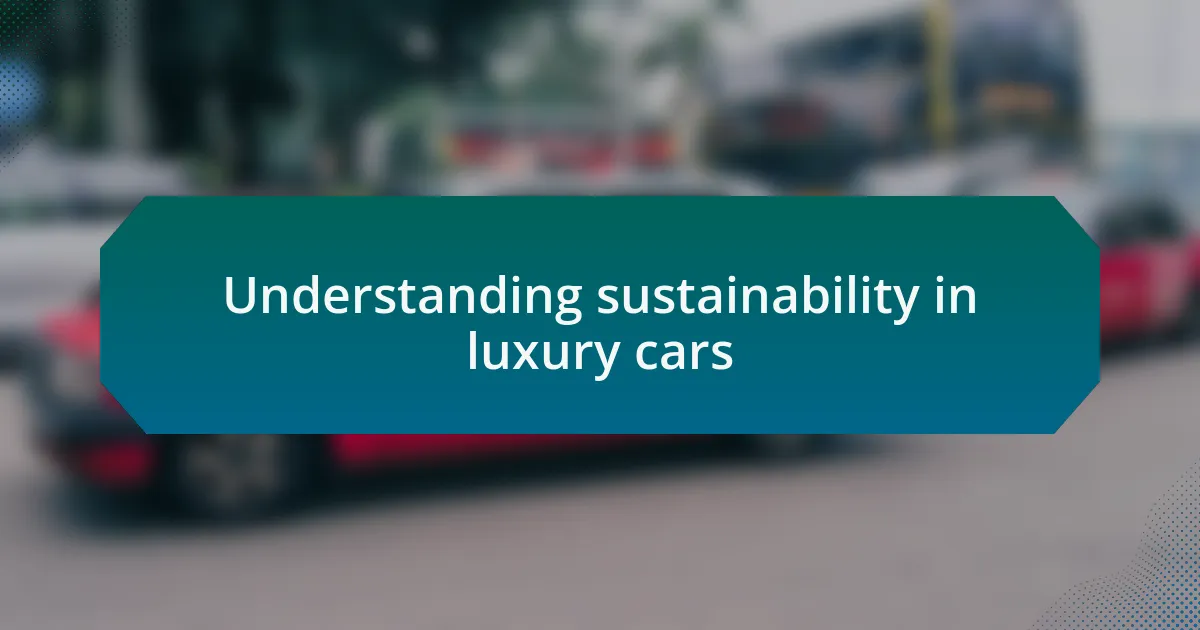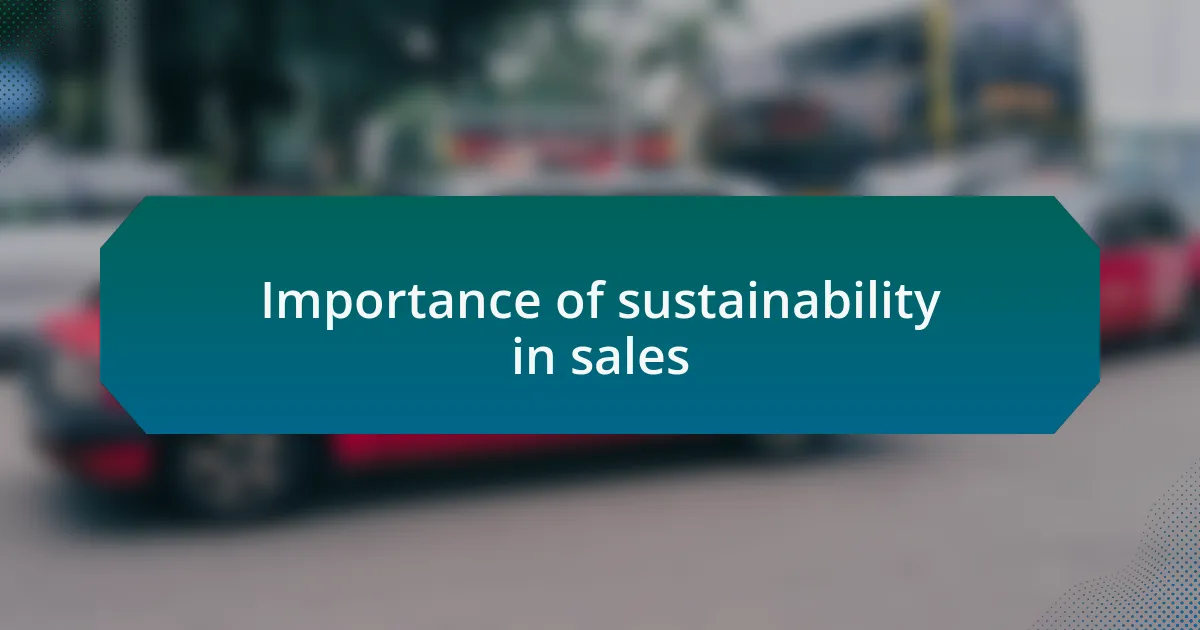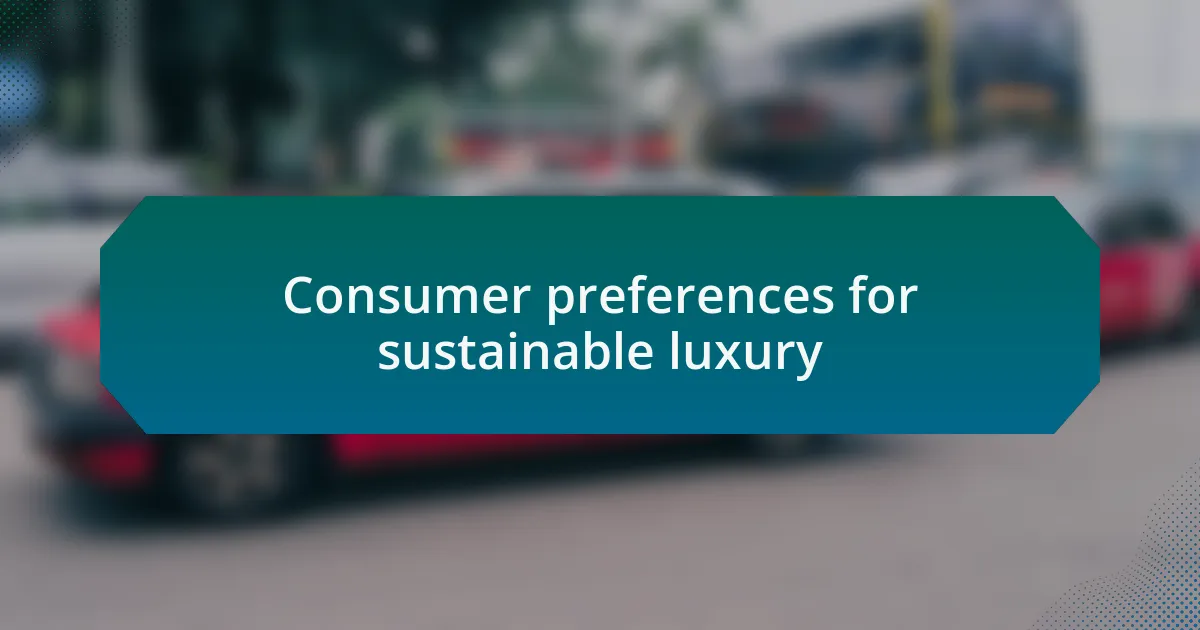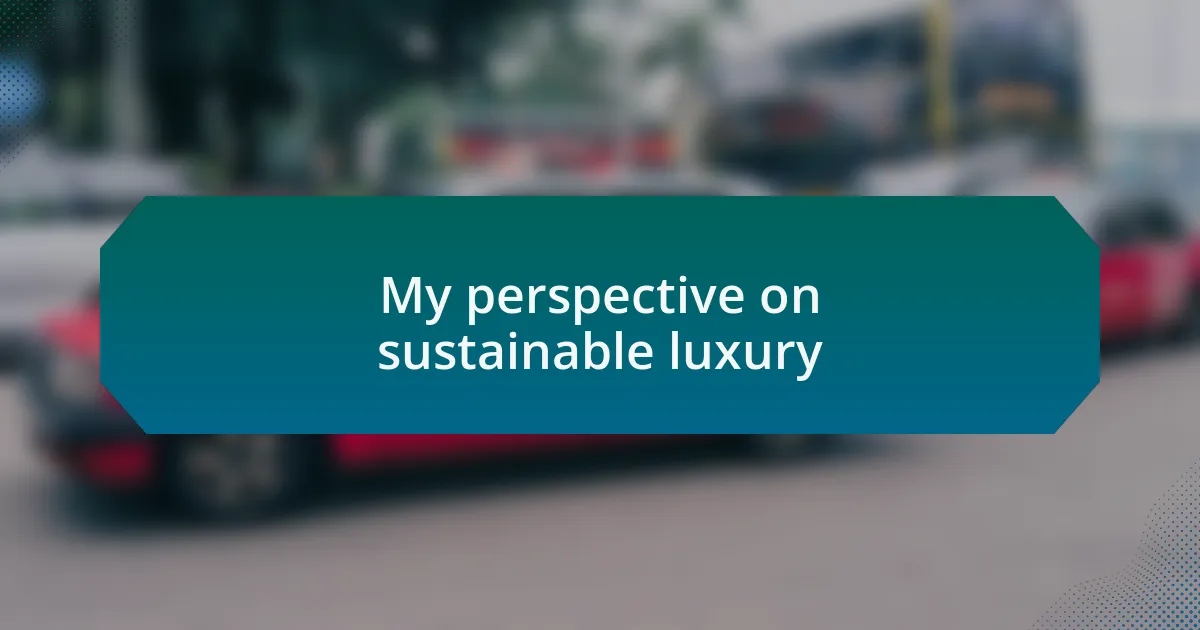Key takeaways:
- Sustainability is becoming an essential aspect of luxury cars, as consumers demand eco-friendly materials and technologies.
- Buyers are increasingly interested in a vehicle’s carbon footprint, reflecting a desire for ethical investment over mere prestige.
- Transparency in sustainable practices influences consumer choices, with buyers seeking brands that align with their values.
- The emotional connection to sustainable luxury is growing, with purchases viewed as lifestyle choices that support environmental innovation.

Understanding sustainability in luxury cars
Sustainability in luxury cars is more than just a buzzword; it’s becoming an integral part of what defines modern luxury. I remember being at an auto show where a leading brand unveiled their electric model, showcasing not only sleek design but also eco-friendly materials. It made me realize that luxury consumers are now seeking vehicles that reflect their values, blending opulence with responsibility.
When we think of luxury vehicles, the image of rich leather and powerful engines often comes to mind. But have you ever considered the impact of these choices on our planet? Personally, the shift towards using sustainable materials—like recycled metals and vegan leathers—makes me optimistic about the future of luxury driving. It’s comforting to know that we can enjoy high-performance cars while still caring for our environment.
Moreover, the integration of advanced technology in these vehicles often goes hand in hand with sustainability. I’ve been fascinated by how many luxury brands are investing in hybrid and electric technologies, reinventing both performance and efficiency. It raises an interesting question: how do luxury and sustainability coexist in a space often associated with excess? The answer is evolving, and it’s exciting to be part of this journey toward responsible luxury.

Importance of sustainability in sales
The importance of sustainability in sales is becoming increasingly evident as consumers grow more conscious of their choices. When I recently spoke to a luxury car salesperson, they mentioned how clients now often inquire about a vehicle’s carbon footprint before making a purchase. This shift highlights that buyers are no longer solely focused on the prestige associated with a brand; they want to invest in products that align with their ethical values.
Additionally, I’ve noticed that brands that emphasize sustainability in their marketing often see a positive response from consumers. I remember reviewing a campaign from a luxury brand that featured their commitment to sourcing renewable materials. The strong engagement metrics they reported showed that customers were not just interested—they were inspired. This raises an important consideration: how can companies ensure that their sustainability efforts are communicated effectively to resonate with their target audience?
Ultimately, sustainability is not just a trend; it’s becoming a necessity for survival in the luxury market. I’ve seen firsthand how brands that fail to adapt may risk losing relevance. It’s fascinating to witness how these companies are innovating to not only meet customer expectations but to also create a deeper emotional connection through shared values. The real question is: can luxury redefine itself by embracing sustainability in a way that captivates a new generation of discerning buyers?

Consumer preferences for sustainable luxury
When I think about consumer preferences for sustainable luxury, it’s clear that buyers are demanding more than just lavish features; they want to feel good about their choices. I remember attending an exclusive event where a luxury car brand showcased their new electric model. The excitement wasn’t just about the sleek design; attendees were genuinely intrigued by how the vehicle reduced emissions. It was a moment that reinforced the idea that consumers yearn for a connection between luxury and environmental responsibility.
I’ve also noticed a growing trend among luxury buyers who actively seek out brands that demonstrate transparency in their sustainable practices. People are more informed now; they want to know the story behind the materials used and the ethical considerations of the production process. At a recent luxury car show, a potential buyer engaged the sales team with pointed questions about sustainable sourcing. This level of inquiry illustrates how consumers are shifting their spending towards brands that resonate with their values and contribute positively to the planet.
Interestingly, I’ve found that sustainability in luxury isn’t just a checkbox for many shoppers; it’s becoming an integral part of their identity. In conversations with friends, several shared how their choices in luxury purchases reflect their commitment to a greener lifestyle. It’s fascinating to consider how luxury brands can leverage this shift—will they rise to the occasion and foster a brand narrative that intertwines opulence with sustainability? The proactive approach could not only set them apart but also build a loyal clientele that feels aligned with their mission.

My perspective on sustainable luxury
My perspective on sustainable luxury has evolved as I see the convergence of personal values and high-end preferences. I recall a captivating discussion with a friend who recently purchased a luxury hybrid vehicle. She shared her thrill in finding a car that not only offered superior performance but also aligned with her commitment to sustainability. This blending of luxury with eco-conscious choices struck me as a profound shift—one that indicates a longing for authenticity in our purchases.
I’ve often pondered the idea of luxury being redefined. It’s no longer solely about exclusivity or opulence; it’s about making a statement that reflects one’s principles. For instance, during a test drive of an eco-friendly luxury sedan, the experience was not just exhilarating; it was empowering. I felt as if I was part of a movement that values both prestige and planet care. Isn’t it remarkable how the status associated with luxury is shifting towards embracing responsibility as a core component?
The emotional connection consumers feel towards sustainable luxury is a game-changer. I recently spoke to a couple who expressed their pride in supporting brands focused on sustainability. They told me their recent purchase wasn’t just a car; it was a lifestyle choice that signaled their support for environmental innovation. It’s heartening to see how these choices resonate deeply with buyers, creating a community united by a common goal. In what ways will luxury brands rise to meet these expectations? The future certainly holds exciting possibilities.